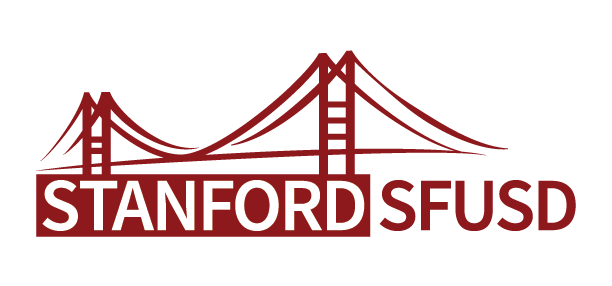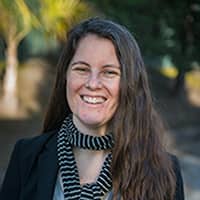Stanford-SFUSD Partnership

Stanford University and San Francisco Unified School District partnership unites research and practice to shape educational practices and policies that maximize educational experiences for all students. The Partnership matches researchers from Stanford University’s Graduate School of Education with SFUSD district leaders to address challenges and support improvements. Together, they create research projects that directly inform the school district’s work to transform teaching and learning for each and every child in the 21st century.
Stanford-SFUSD Partnership 2024 Year-in-Review
Laura Wentworth

Director of Research Practice Partnerships
California Education Partners
laura@caedpartners.org
@StanfordSFUSD on Twitter
Our Mission and Vision

How We Work

Learn More About Us
What are the conditions under which research-practice partnerships succeed? by Caitlin C. Farrell, Laura Wentworth, and Michelle Nayfack in Phi Delta Kappan. March 22, 2021.
A university and district partnership closes the research-to-classroom gap, by Laura Wentworth, Richard Carranza, and Deborah Stipek in Phi Delta Kappan. May 1, 2016.
The Stanford-SFUSD Partnership: Development of Data-Sharing Structures and Processes, by Moonhawk Kim, Jim Shen, Laura Wentworth, Norma Ming, Michelle Reininger, and Eric Bettinger, in Handbook on Using Administrative Data for Research and Evidence-based Policy. 2020.
Featured Resources
Stanford-SFUSD Partnership 2024 Year-in-Review
This document outlines the vision, mission and current objectives of the Stanford-SFUSD Partnership and highlights the key accomplishments from the research and practice teams working in relation to the Stanford-SFUSD Partnership this year.
Summary of Findings: The Impact of Mastering Cultural Identity (MCI) in the San Francisco Unified School District by Thomas S. Dee & Jaymes Pine
Fran KipnisThis brief highlights findings and implications from a study investigating the impact of culturally relevant pedagogy (CRP), specifically the Mastering Cultural Identity (MCI) program, on student retention in the San Francisco Unified School District (SFUSD). The MCI program, part of SFUSD’s African American Achievement and Leadership Initiative (AAALI), offers culturally sustaining coursework for African American […]
Instructional Reform Facilitator Knowledge Sharing in San Francisco Unified School District
Kemi A. Oyewole, Eve ArbogastThis brief summarizes two phases of a research study on the San Francisco Unified School District (SFUSD) Instructional Reform Facilitator (IRF) Network created to learn and promote equity for underserved groups, such as African American students, multilingual learners, and students with Individual Education Plans. The IRFs set out to meet these needs by coaching teachers, […]
Summary of: Core Rubric Feedback Survey Results by Dr. Rebecca Deutscher and Dr. Janet Carlson
Fran KipnisThis brief summarizes the report, CORE Rubric Feedback Survey Results, by Dr. Rebecca Deutscher and Dr. Janet Carlson which highlights findings from a study focused on the San Francisco Unified School District (SFUSD) use of the CORE Rubric. The research was conducted by a collaboration of Stanford University researchers and SFUSD educators. The CORE Rubric […]
Fifteen Years of Research about San Francisco’s Student Assignment Policy
Fran KipnisSince 2009, there have been a number of research projects involving Stanford University and other research organizations working with the San Francisco Unified School District to examine San Francisco’s student assignment policy. This brief outlines the three themes stemming from the research findings: 1) A number of factors influence whether schools effectively serve a diverse […]
School Reorganization in SFUSD: Survey II Results
Francis A. PearmanThis presentation highlights findings from a survey of SFSUD parents, school staff, students and community members. The purpose of the survey was to 1) introduce the metrics the District will use as they make their school closure/consolidation/merger decisions for SY 2025/2026 and 2) gather information about the relative importance that the community places on the […]
Summary of “More than a Test Teacher Sensemaking of Educational Policies and Assessments to Inform Mathematical Opportunities in Elementary Classrooms”
Rosa Del Carmen Chavez, Fran KipnisThis research brief summarizes the dissertation, More than a Test: Teacher Sensemaking of Educational Policies and Assessments to Inform Mathematical Opportunities in Elementary Classrooms by Rosa Del Carmen Chavez. The dissertation discusses a study focused on understanding the “multilayered relationship between educational policies and students’ mathematical identity development by highlighting the role that teachers play […]
Summary of: Designing School Choice for Diversity in the San Francisco Unified School District
Irene Yuan Lo, Itai Ashlagi, Michael Peter Hong, Stanford University with assistance from Fran Kipnis, California Education PartnersThis brief summarizes the paper, Designing School Choice for Diversity in the San Francisco Unified School District1 which describes a collaboration between Stanford University researchers and the San Francisco Unified School District (SFUSD) to re-design the district’s elementary student assignment system. The existing district-wide choice system replicates patterns of residential segregation at district schools and […]
Practices, Structures, and Systems for Supporting Multilingual Learners in SFUSD
This summary of research evidence finds five instructional practices, structures or policies related to multilingual students (otherwise known as “English Learners”) that are associated with positively impacting teaching and learning. This summarizes research from 2010-2018 conducted between Stanford University and San Francisco Unified School District.
Evaluation of utilization and potential effects of the SFUSD Multi-Tiered System of Supports (MTSS)
Radhika Kapoor and Ben DomingueThe San Francisco Unified School District Multi-Tiered System of Supports (MTSS) is a differential resource allocation system to address equity issues in school funding. MTSS supports schools’ needs for staff across the five essentials: school leadership, professional capacity, instructional guidance, student-centered learning climate, and family-community ties by funding additional personnel resources (i.e., Full Time Equivalents – […]